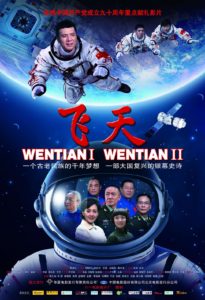The Space Dream
飞天
China, 2011, colour, 2.35:1, 110 mins.
Directors: Wang Jia 王珈, Shen Dong 沈东.
Rating: 6/10.
Good-looking, widescreen paean to China’s manned space programme.
China, c. 2008. The son of a peasant family, Zhang Tiancong (Liu Zhibing) is a veteran member of the first generation of Chinese astronauts but, now in his 40s, has yet to be selected for a space mission. One of those in contention for the Shenzhou VII mission, Zhang Tiancong is once again passed over, and put in charge of the support team on the ground. His teenage daughter Zhang Siyu (Jiang Ruijia), who dreams of becoming a fighter pilot, is disappointed; his wife, Qu Dan (Niu Li) is as stoic as ever. As there won’t be another major mission for a while, his faithful colleagues, Li Dawei (Wu Gang) and Zhou Guanxiong (Zhao Xiaoming), need to reconsider their own futures and decide whether to stay with Zhang Tiancong. Qu Dan urges Zhang Tiancong to step back and spend more time with her and their daughter, but he decides to carry on and train a new intake of astronauts for the Shenzhou IX mission. Li Dawei and Zhou Guanxiong decide to stay with him, but are subsequently transferred. A year later, the final six young astronauts – four men and two women – have been selected for the mission, with Zhang Tiancong as their chief trainer. The group goes into intensive preparation, including a visit to the Gagarin Space Centre in Russia, where they train in weightlessness alongside some Americans. While Zhang Tiancong is there, his mother (Bai Qing) is hospitalised with a brain tumour but the news is kept from Zhang Tiancong so as not to interrupt his work. Meanwhile, Zhang Siyu graduates as a fighter pilot. On his return from Russia, Zhang Tiancong and his group go into closed final training, and are divided into two groups of three, one headed by Zhang Tiancong, with Zhou Xiaosu (Zhang Xiaopei) and Wang Lisan (Wu Qijiang), and the other headed by the younger Xie Chaoyang (Yu Bo). One of the two groups is to be selected to fly the Wentian I docking mission, an important component of China’s ambition to establish a manned space station.
REVIEW
Though most of its product is hardly exportable, except to Asian film weeks and as curio items at festivals, the PLA-backed August First Studio consistently comes up with some of the classiest-looking big-budget Mainland product, and The Space Dream 飞天 is no exception. Luxuriantly shot in rich colours, and making full use of widescreen and split screen, the movie is much slicker than Sky Fighters 歼十出击 (2010, aka Lock Destination) and has a bright-eyed positiveness that will appeal to anyone jaded by today’s conflicted western heroes. In its simplicity, and unwillingness to get tied up in science for its own sake, it also recalls an earlier age of space movies where a few switches and flashing lights, plus a couple of astro-cuties, did the trick.
The movie is basically a paean to China’s space programme and the importance of the country having a manned space station – currently scheduled for 2020 – to cement its global primacy alongside Russia and the US. Just as the primary message of Sky Fighters was that China must have control of its own skies, so the message here is that China must have the place it deserves at the international space table.
That’s no different a message from those of other space movies from major powers, and in general the film, too, is pretty much the same, with the usual stock characters. On the surface, however, the script is less about a whole country’s dream than that of one man – middle-aged astronaut Zhang Tiancong, who’s never actually got off the ground in 20 years. Actor Liu Zhibing 刘之冰 has a kind of rugged niceness that fits the role well, though on the acting side he’s eclipsed by Niu Li 牛莉 as his faithful wife, a cliched role she gives some substance to. Disappointingly, the script makes no effort to create any conflict between (or meaningful characterisation of) the six young hopefuls under Zhang Tiancong’s tutelage, making the film quite mono-centric. During its second half, prior to the finale, it’s little more than a space-training procedural – even throwing in a trip to Russia – though never draggy.
Apart from a couple of shots prior to the climax, visual effects are fine, while the musical score by Ye Xiaogang 叶小钢 is suitably uplifiting. The film is also known under the English titles Shenzhou 11 and Wentian I Wentian II.
CREDITS
Presented by Huaxia Film Distribution (CN), China Film Studio (CN), August First Film Studio (CN). Produced by August First Film Studio (CN).
Script: Liu Jianwei, Liu Hongwei, Wang Qiang, Zhao Junfang, Liang Shuibao. Photography: Qiang Jun, Wang Yang, Yu Xuejun, Qin Ling. Editing: Yan Xiaoqiu, Wang Miao. Music: Ye Xiaogang. Art direction: Xu Feng, Zhao Lixin, Luo Lan. Sound: Zhang Lei, Deng Jianru, Ji Chenggang. Visual effects: Meng Hao, Lei Zhenyu, Zhang Fuzhi.
Cast: Liu Zhibing (Zhang Tiancong), Niu Li (Qu Dan, Zhang Tiancong’s wife), Jiang Ruijia (Zhang Siyu, Zhang Tiancong’s daughter), Wu Gang (Li Dawei), Zhao Xiaoming (Zhou Guanxiong), Jin Xin (Tian Mingzhao), Li Youbin (general), Ma Xiaowei (chief engineer), Yu Bo (Xie Chaoyang), Xu Jian (Wu Changfeng), Wu Qijiang (Wang Lisan), Wang Jing (Xue Yimeng), Zhang Xiaopei (Zhou Xiaosu), Feng Enhe (Zhang Tianzhi), Bai Qing (Zhang Tiancong’s mother), Wang Lan (Zhang Tianzhi’s wife), Wan Siwei (Wang Xiaojun, Zhang Siyu’s boyfriend).
Release: China, 1 Jul 2011.
(Review originally published on Film Business Asia, 31 Oct 2011.)
